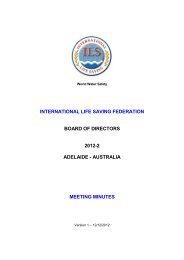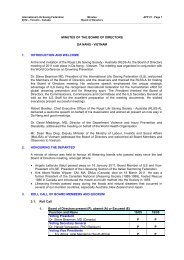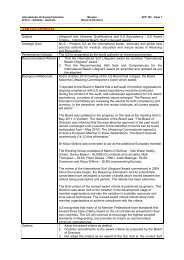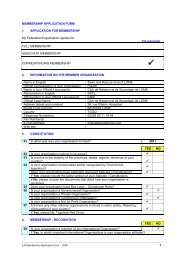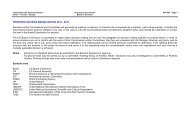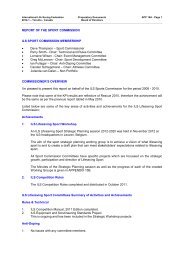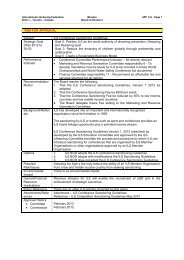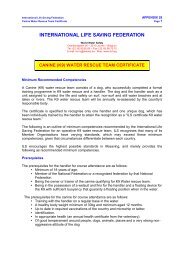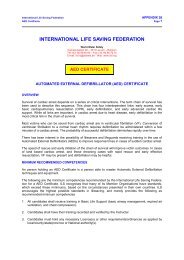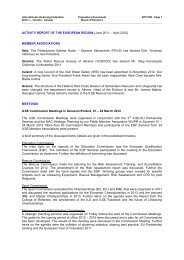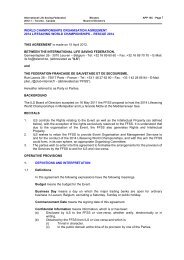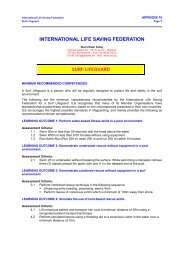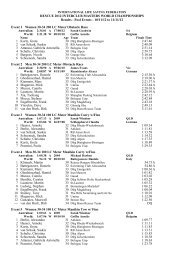BOD 2012-1 MIN APP 13B - IFA Aid Effectiveness.pdf - International ...
BOD 2012-1 MIN APP 13B - IFA Aid Effectiveness.pdf - International ...
BOD 2012-1 MIN APP 13B - IFA Aid Effectiveness.pdf - International ...
Create successful ePaper yourself
Turn your PDF publications into a flip-book with our unique Google optimized e-Paper software.
<strong>International</strong> Life Saving Federation Minutes <strong>APP</strong> <strong>13B</strong> - Page 1<br />
<strong>2012</strong>-1 – Toronto - Canada Board of Directors<br />
ITEM FOR <strong>APP</strong>ROVAL<br />
Subject<br />
Strategic Goal<br />
ILS Position Statement on Development <strong>Aid</strong> <strong>Effectiveness</strong><br />
This position statement advances the following strategic goal(s):<br />
1. Build the capacity to reduce drowning within targeted at-risk<br />
communities of the world.<br />
2. Position ILS as the international leader, advocate and global best<br />
practice authority for medical, education and rescue issues in lifesaving<br />
and lifeguarding.<br />
3. Form alliances, advocate and implement strategies to reduce the<br />
drowning of children globally.<br />
Performance Indicator<br />
This position statement contributes to the following Key Performance<br />
Indicators (KPI) and the Commission Performance Indicator (CPI):<br />
1. Initiate a minimum of one sustainable significant drowning prevention<br />
project according to the ILS priority list of at-risk communities.<br />
2. Plan, co-ordinate and implement a strategy to assist Africa in building<br />
its capacity to respond to regional issues.<br />
3. Enter into additional formal strategic alliances with… (To be identified)<br />
Recommendation/Motion That ILS ratifies the Position Statement on Development <strong>Aid</strong> <strong>Effectiveness</strong>.<br />
Background/Rationale This position statement provides guidance to ILS and ILS members on<br />
what constitutes effective development aid. It reinforces how stakeholders<br />
can contribute to the achievement of ILS objectives across drowning<br />
prevention, lifesaving and lifesaving sport by working within frameworks of<br />
the UN agendas including the Paris Declaration on <strong>Aid</strong> <strong>Effectiveness</strong><br />
(2005), the Accra Agenda for Action (2008) and the Busan Partnership for<br />
Effective Development Cooperation (2011).<br />
ILS and ILS members are increasing activities in areas that overlap with<br />
various UN agendas. Many <strong>International</strong> NGOs are aligning their work and<br />
policies to the principles of ownership, alignment, managing for results and<br />
mutual accountability.<br />
This position statement will assist ILS and members in forming partnerships<br />
across the development sector.<br />
Options<br />
In addition to ratification, ILS Board may consider writing to all members<br />
and partners to encourage adoption or replication of this position<br />
statement. Members in Low and Middle Income countries may find this of<br />
particular value.<br />
Potential Risk/Issues This position statement is an important step in the creation of ILS<br />
relationships in the development aid context. Donors may look beyond to<br />
ratification of position statements but also to evidence of consistent<br />
practice.<br />
Environmental Impact No negative environmental impacts are foreseen.<br />
Human/Financial This item requires no funds or additional human resources.<br />
Resource Implications<br />
Policy Reference None known.<br />
Attachments/References Position Statement Attached<br />
Consultation<br />
This position statement has been developed, reviewed and approved by<br />
members of the drowning prevention commission, as well as co-opted<br />
reviewers. Contributors include:<br />
Justin Scarr – Drowning Prevention Commissioner<br />
Norm Farmer – Commission Member & SLSA <strong>International</strong> Development<br />
Coordinator
<strong>International</strong> Life Saving Federation Minutes <strong>APP</strong> <strong>13B</strong> - Page 2<br />
<strong>2012</strong>-1 – Toronto - Canada Board of Directors<br />
Arne Navarra – President of Philippine Life Saving Society (co-opted<br />
reviewer)<br />
Justin Bakinga – President of Cameroon Life Saving Society (Co-opted<br />
reviewer)<br />
Francene Leaversuch – RLSS Chief Executive Officer (co-opted reviewer)<br />
Further review was sought from Canadian <strong>International</strong> Development<br />
Coordinator, Patrick D’Almada.<br />
Approval History:<br />
Committee<br />
Commission<br />
Approved after extensive development and review by representatives of the<br />
ILS Drowning Prevention Commission.
<strong>International</strong> Life Saving Federation Minutes <strong>APP</strong> <strong>13B</strong> - Page 3<br />
<strong>2012</strong>-1 – Toronto - Canada Board of Directors<br />
ILS POSITION STATEMENT ON DEVELOPMENT AID EFFECTIVENESS<br />
The <strong>International</strong> Life Saving Federation (ILS) is the world authority for drowning prevention, lifesaving<br />
and lifesaving sport. The ILS leads, supports and collaborates with national and international<br />
organisations engaged in drowning prevention, water safety, water rescue, lifesaving, lifeguarding and<br />
lifesaving sport.<br />
In pursuit of this mission, the humanitarian traditions of ILS and its members seek to build national and<br />
member capacity to reduce drowning and provide lifesaving services. These activities intersect with<br />
the principles of development aid effectiveness. These principles are governed and monitored by the<br />
United Nations, and are implemented by Governments, multi-lateral and bilateral organisations, nongovernment<br />
organisations (NGOs) and donors.<br />
This position statement seeks to provide guidance to ILS members and collaborating partners on what<br />
constitutes effective development aid, and how stakeholders can work within frameworks of the Paris<br />
Declaration on <strong>Aid</strong> <strong>Effectiveness</strong> (2005), the Accra Agenda for Action (2008) and the Busan<br />
Partnership for Effective Development Cooperation (2011) to contribute to the achievement of ILS<br />
objectives across drowning prevention, lifesaving and lifesaving sport.<br />
What is Development <strong>Aid</strong>?<br />
<br />
<br />
<br />
Governments, multilaterals, NGOs and donors use a variety of terminology to describe financial<br />
and technical assistance exchanged between partners for the purpose of supporting economic,<br />
social, health or political development in low and middle income countries (LMICs).<br />
Commonly used terms include; development aid, development cooperation, development<br />
assistance, technical assistance, international aid, overseas aid, official development assistance<br />
(ODA), and foreign aid are also used.<br />
Often this transfer of development aid flows to countries considered to be low or low middle<br />
income countries (LMICs). It may be transferred direct to Governments or in partnership with<br />
multilaterals, national and international NGOs, and the private sector.<br />
Preferred terminology<br />
<br />
<br />
<br />
Development aid is the preferred terminology of ILS and is used throughout this position<br />
statement to mean financial and technical assistance exchanged between partners for the<br />
purpose of supporting economic, social, health or political development in low and middle<br />
income countries (LMICs).<br />
Development <strong>Aid</strong> Partnership is a term used to describe parties working under cooperative<br />
agreement to advance common development aid goals. Parties may include donors and<br />
recipients, but partnership it used to reinforce the principles of mutual benefit.<br />
In this position statement Development <strong>Aid</strong> Partnerships is a term used to describe partnerships<br />
focused on financial and technical assistance exchanged for the purposes of reducing drowning<br />
in LMICs. Participants may include members and partners, Governments, multilateral and<br />
bilateral organisations and donors.<br />
Paris Declaration on <strong>Aid</strong> <strong>Effectiveness</strong> 1<br />
<br />
<br />
<br />
In response to the challenges of achieving the United Nations Millennium Development Goals,<br />
Governments and multilateral and bilateral development institutions resolved to look beyond aid<br />
volume and focus on aid effectiveness.<br />
The Paris Declaration on <strong>Aid</strong> <strong>Effectiveness</strong> (2005) builds upon previous agreements to<br />
harmonise and align aid delivery, to be more adaptive to differing situations, to set indicators,<br />
timetables and targets, and to monitor and evaluate implementation.<br />
Signatories to this declaration are defined as partner countries or donors and commit to the<br />
principles outlined in Table 1.
<strong>International</strong> Life Saving Federation Minutes <strong>APP</strong> <strong>13B</strong> - Page 4<br />
<strong>2012</strong>-1 – Toronto - Canada Board of Directors<br />
<br />
Governments, multilateral and bilateral organisations, and NGOs commonly express and<br />
monitor their commitment to these principles via various mechanisms including through public<br />
charters, annual reports and independent evaluations.<br />
Table 1: Paris Declaration on <strong>Aid</strong> <strong>Effectiveness</strong><br />
COMMITMENT<br />
OWNERSHIP<br />
ALIGNMENT<br />
HARMONISATION<br />
MANAGING FOR<br />
RESULTS<br />
MUTUAL<br />
ACCOUNTABILITY<br />
DESCRIPTION<br />
Partner countries (recipients) exercise effective leadership over their<br />
development policies, and strategies and co-ordinate development actions.<br />
Donors base their overall support on partner countries’ national<br />
development strategies, institutions and procedures.<br />
Donors’ actions are more harmonised, transparent and collectively effective.<br />
Managing resources and improving decision-making for results.<br />
Donors and partners are accountable for development results<br />
Accra Agenda for Action 2<br />
In an effort to strengthen implementation of the Paris Declaration on <strong>Aid</strong> <strong>Effectiveness</strong> Governments<br />
and multilateral and bilateral development institutions endorsed the Accra Agenda for Action (2008).<br />
This sets out an emphasis on:<br />
Strengthening country ownership over development where LMICs determine and implement<br />
their development policies to achieve their own economic, social and environmental goals.<br />
Building more effective and inclusive partnerships for development that fully harness the<br />
energy, skills and experience of all participants.<br />
Delivering and accounting for development results through greater transparency and<br />
accountability for the use of development resources.<br />
Busan Partnership for Effective Development Cooperation 3<br />
<br />
<br />
<br />
The Busan Forum recognised that effective international development is founded on shared<br />
principles, common goals and differential commitments.<br />
The participants committed to modernise, deepen and broaden their co-operation, involving<br />
state and non-state actors and in forging a new global development partnership that embraces<br />
diversity and recognises the distinct roles that all stakeholders in co-operation can play to<br />
support development.<br />
The Forum agreed on shared common principles consistent with their international<br />
commitments on human rights, decent work, gender equality, environmental sustainability and<br />
disability.<br />
o Ownership of development priorities by developing countries.<br />
o Focus on results.<br />
o Inclusive development partnerships.<br />
o Transparency and accountability to each other.<br />
Development <strong>Aid</strong> Partnerships in the ILS context<br />
<br />
<br />
<br />
In the ILS context, development aid has been used to describe assistance provided at global,<br />
regional or membership levels to partners in LMICs. This is commonly directed towards existing<br />
or emerging NGOs or other partners in nations with high rates of drowning but without existing<br />
membership.<br />
Common activities include technical support, training and development, organisational capacity<br />
building, limited funds, membership subsidies and equipment donations.<br />
Lifesaving agencies in LMICs often express concern at development aid and commercial<br />
activities initiated in their nation without their consultation or in direct competition to their<br />
activities. This position statement is intended to alleviate these concerns.
<strong>International</strong> Life Saving Federation Minutes <strong>APP</strong> <strong>13B</strong> - Page 5<br />
<strong>2012</strong>-1 – Toronto - Canada Board of Directors<br />
<br />
<br />
<br />
More recently and in response to research 4 that shows that over 95% of drowning occurs in<br />
LMICs, ILS development aid focus has extended to support provided specifically to<br />
development aid projects focused on drowning prevention interventions and research, often in<br />
partnership with Government, multilateral and bilateral organisations, NGOs and donors.<br />
It is expected that as ILS works to achieve its goals, an increased focus on development aid will<br />
necessitate the adoption of the principles of development aid effectiveness.<br />
ILS has a role in leading implementation of these principles and in monitoring and evaluating<br />
progress.<br />
Table 2 provides an ILS perspective on the principles of the Paris Declaration on <strong>Aid</strong> <strong>Effectiveness</strong>.<br />
Table 2: An ILS perspective on the Paris Declaration on <strong>Aid</strong> <strong>Effectiveness</strong><br />
COMMITMENT<br />
OWNERSHIP<br />
ALIGNMENT<br />
HARMONISATION<br />
MANAGING FOR<br />
RESULTS<br />
MUTUAL<br />
ACCOUNTABILITY<br />
DESCRIPTION<br />
Ownership of Development <strong>Aid</strong> Partnerships policies and actions must be<br />
determined by recipient countries, members and communities and tailored to<br />
country-specific situations and needs.<br />
Development <strong>Aid</strong> Partnerships must ensure that support is directed or<br />
aligned to the actual and prioritised need of the recipient countries, members<br />
and communities.<br />
Development <strong>Aid</strong> Partnerships must ensure that actions are coordinated and<br />
complementary across donors to improve effectiveness and maximise use of<br />
resources. Where actions intersect with those conducted by donors in other<br />
sectors, all efforts must be taken to align these activities.<br />
Steps must be taken to ensure that Development <strong>Aid</strong> Partnership actions are<br />
evaluated for impact and effectiveness, and that such knowledge is shared<br />
for the benefit of the all countries, members and communities, and those<br />
seeking to initiate other such partnerships<br />
All participants in Development <strong>Aid</strong> Partnerships are encouraged to publish<br />
development plans and results in a manner that encourages mutual<br />
accountability.<br />
ILS and the United Nations<br />
<br />
<br />
<br />
<br />
Given the role of the UN in coordinating development aid efforts, it is important to note ILS<br />
partnerships with related international bodies.<br />
In 1996 ILS received recognition by the <strong>International</strong> Olympic Committee (IOC). ILS is uniquely<br />
positioned in that it governs a sport that is deeply tied to humanitarian endeavours. In this<br />
respect ILS works with the United Nations Office on Sport for Development and Peace<br />
(UNOSDP)<br />
World Health Organisation (WHO) is the directing and coordinating authority for health within<br />
the United Nations system. In January 2010, WHO recognised ILS for its role and expertise in<br />
global drowning prevention via WHO Official Relations status.<br />
ILS continues to pursue formal recognition and partnership with other UN agencies which have<br />
coordinating roles in development areas such as UNICEF.<br />
Statements<br />
1. ILS and its members have a long tradition of humanitarian action in terms of a commitment to<br />
reducing drowning and building the capacity of its members and partners in developing<br />
countries.<br />
2. ILS recognises and stands committed to strengthening its capacity and performance in respect<br />
to development aid effectiveness.<br />
3. ILS is committed to the principles of aid effectiveness as expressed through the Paris<br />
Declaration on <strong>Aid</strong> <strong>Effectiveness</strong>, the Accra Agenda for Action and the Busan Partnership for<br />
Effective Development Cooperation.<br />
4. ILS expresses this commitment by ensuring that Development <strong>Aid</strong> Partnerships, their policies<br />
and actions are aligned to the principles of:
<strong>International</strong> Life Saving Federation Minutes <strong>APP</strong> <strong>13B</strong> - Page 6<br />
<strong>2012</strong>-1 – Toronto - Canada Board of Directors<br />
a. Ownership<br />
b. Alignment<br />
c. Harmonisation<br />
d. Managing for results<br />
e. Mutual accountability<br />
5. ILS Development <strong>Aid</strong> Partnerships are directed towards:<br />
a. Reducing or preventing global drowning with an emphasis on high drowning regions,<br />
countries and communities.<br />
b. Building recipient country or lifesaving member capacity to reduce drowning and provide<br />
lifesaving services.<br />
c. Partnering with multilateral and bilateral organisations, NGOs, donors, members and<br />
partners to contribute resources and expertise within our areas of interest and expertise.<br />
6. ILS recognises the importance of the rights of development aid recipients to ownership and<br />
determination of the development aid priorities, policies and strategies used within Development<br />
<strong>Aid</strong> Partnerships. ILS members and partners are encouraged to ensure that all Development<br />
<strong>Aid</strong> Partnerships support of the principles of ownership and determination at recipient country,<br />
member and community levels.<br />
7. ILS recognises that it must ensure that Development <strong>Aid</strong> Partnerships are coordinated, aligned<br />
to the needs of the recipient and harmonised when two or more members are engaged in<br />
activity in a single country or region.<br />
a. This is reflected in the development aid plans and strategies, and coordinating<br />
mechanisms utilised by ILS and its members.<br />
b. ILS recognises that such coordinating mechanisms may operate at global or regional level,<br />
or directly between partners.<br />
8. ILS reinforces the need to ensure that Development <strong>Aid</strong> Partnerships and/or commercial and<br />
no-commercial activities are not conducted by HIC members in LMICs without steps being<br />
taken to consult existing members and/or partners. ILS recognises that members in LMICs are<br />
particularly vulnerable to such activities and that consultation must be initiated in line with this<br />
position statement.<br />
9. ILS embraces the principles of improving decision making and accountability by providing<br />
timely, transparent and comprehensive information with respect to the Development <strong>Aid</strong><br />
Partnerships it initiates, implements or funds.<br />
a. Development <strong>Aid</strong> Partnerships reports will be published on the ILS website.<br />
b. ILS encourages all Development <strong>Aid</strong> Partnerships to share such information in a similar<br />
way.<br />
10. ILS reinforces and embraces the opportunities for shared learning and mutual benefit for both<br />
the donor and recipient inherent in Development <strong>Aid</strong> Partnerships.<br />
11. ILS strongly encourages all members and partners to adopt similar principles in relation to<br />
development aid effectiveness, and to consult the development aid effectiveness policies of<br />
their Governments, and of those who operate in their country, region or community.<br />
12. ILS commits to and encourages all members to ensure that Development <strong>Aid</strong> Partnerships are<br />
evaluated for impact and effectiveness, and that those results are shared openly to encourage<br />
and facilitate improved lifesaving and drowning prevention development aid effectiveness.<br />
Definitions<br />
TERM<br />
Multilateral agencies<br />
Bilateral agencies<br />
Non-government<br />
organisations<br />
DEFINITION<br />
An agency that represents groups of governments but with an<br />
independent legal and operational status. They include those under<br />
the UN system i.e. WHO, UNICEF, and those regionally focused i.e.<br />
Association of South East Asian Nations, European Union.<br />
An agency that representatives a single Government to coordinate<br />
and allocate development priorities in a recipient country i.e. United<br />
States Agency for <strong>International</strong> Development.<br />
A term used to describe a diverse range of international and national<br />
organisations which operate in the development aid sector. Well<br />
known examples include OXFAM and World Vision. NGOs are<br />
sometimes referred to as Civil Society.
<strong>International</strong> Life Saving Federation Minutes <strong>APP</strong> <strong>13B</strong> - Page 7<br />
<strong>2012</strong>-1 – Toronto - Canada Board of Directors<br />
Donors<br />
ACRONYM<br />
ILS<br />
IOC<br />
LMIC<br />
MDG<br />
NGO<br />
ODA<br />
UN<br />
UNICEF<br />
UNOSDP<br />
WHO<br />
A term used to describe all those contributing financial and technical<br />
resources to development aid activities.<br />
MEANING<br />
<strong>International</strong> Life Saving Federation<br />
<strong>International</strong> Olympic Committee<br />
Low and Middle Income Country<br />
Millennium Development Goal<br />
Non-government organisation<br />
(sometimes referred to as civil society organisations)<br />
Overseas development Assistance<br />
United Nations<br />
United Nations Children’s Fund<br />
United Nations Office for Sport Development and Peace<br />
World Health Organisations<br />
References<br />
1<br />
Development Assistance Committee, (2005), The Paris declaration on aid effectiveness and the<br />
Accra Agenda for action. Paris, France: Organisation for Economic Cooperation and Development.<br />
2<br />
Development Assistance Committee, (2008), The Paris declaration on aid effectiveness and the<br />
Accra Agenda for action, Paris, France: Organisation for Economic Cooperation and Development.<br />
3<br />
Busan Partnership for Effective Development Cooperation, (2011) 4th High Level Forum (HLF) on<br />
<strong>Aid</strong> <strong>Effectiveness</strong>, Paris, France: Organisation for Economic Cooperation and Development.<br />
4<br />
<strong>International</strong> Life Saving Federation, <strong>International</strong> Life Saving Federation World Drowning Report.<br />
<strong>International</strong> Journal of Aquatic Research and Education, 2007. 1(4): p. 381-401.<br />
DEVELOPED BY<br />
ILS Drowning Prevention Commission<br />
<strong>APP</strong>ROVED BY<br />
ILS Drowning Prevention Commission<br />
Justin Scarr<br />
Drowning Prevention Commissioner



